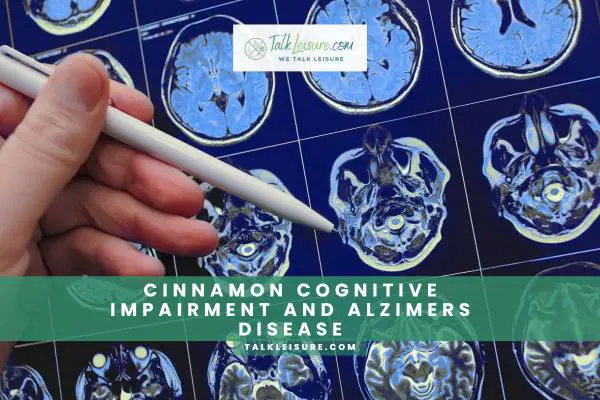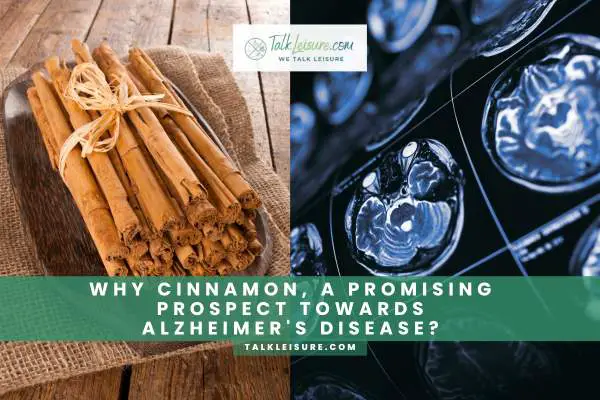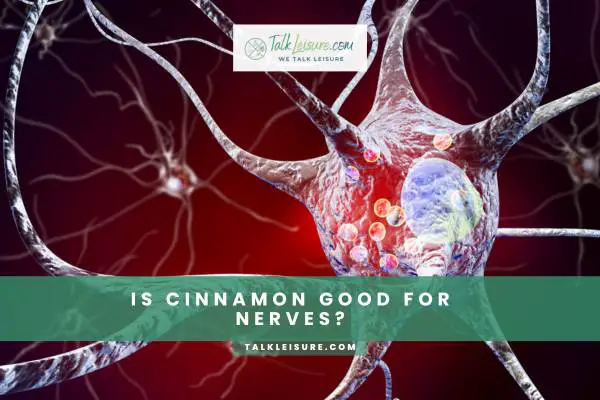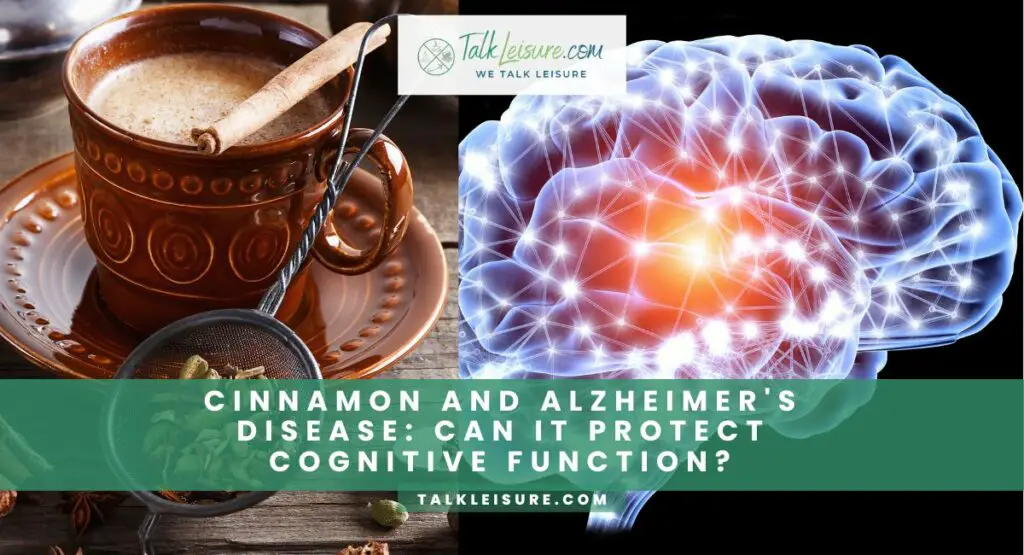Cinnamon, a popular spice known for its sweet and warm flavor, has not only been a kitchen favorite but also a subject of growing interest in health research.
Recent studies have suggested a potential link between cinnamon consumption and its impact on cognitive function, particularly in the context of Alzheimer’s disease.
Alzheimer’s, a progressive neurodegenerative disorder, poses significant challenges to cognitive health.
While more research is needed to establish conclusive evidence, the intriguing connection between cinnamon and cognitive function offers hope for future possibilities in brain health.
Cinnamon And Brain Health

Cinnamon, a spice commonly used in baking and cooking, improves brain function and protects against cognitive decline.
Furthermore, cinnamon may also enhance memory and cognitive performance by regulating neurotransmitter levels in the brain.
Its potential therapeutic effects on Alzheimer’s and Parkinson’s diseases have also been explored in some studies, making it a promising prospect for brain health.
Therefore, incorporating cinnamon into your diet or supplement routine may benefit your brain and improve your productivity and cognitive function.
Can Cinnamon Improve Learning And Memory?

In that study conducted at Shahid Sadooghi University of Medical Sciences in Yazd, Iran, researchers investigated the impact of cinnamon extract on mice’s learning and short-term memory.
The study involved twenty mice divided into four groups, one serving as a reference.
The mice underwent tests using Shuttle Box equipment, and the data were analyzed using statistical methods.
The results revealed that mice receiving a cinnamon dose of 500 mg/kg experienced a significant decrease in both learning and short-term memory scores compared to the reference group.
Specifically, after three days, the mean score for learning dropped from 67.9±7.7 to 49.9±8.8, and the mean score for short-term memory decreased from 84.5±10.6 to 49.2±21.4.
The findings suggest that cinnamon extract may have a notable impact on the learning and short-term memory functions of the nervous system in mice.
However, the researchers recommend further studies with larger sample sizes to validate and enhance the reliability of these results.
Cinnamon contains antioxidants and anti-inflammatory compounds that protect the brain from oxidative stress and inflammation, which can cause cognitive impairment and decline.
Additionally, cinnamon may help regulate neurotransmitter levels in the brain, which are responsible for learning, memory, and mood.
Cinnamon may promote better communication between brain cells and improve cognitive performance by enhancing neurotransmitter activity.
Therefore, incorporating cinnamon into your diet or supplement routine may positively impact your ability to learn and remember information and enhance overall brain function.
Is Cinnamon A suitable Agent For Cognitive Impairment and Alzheimer’s Disease Associated With Brain Trauma?

Alzheimer’s disease is a progressive neurodegenerative disease that causes memory loss, cognitive decline, and, eventually, complete loss of mental function.
Cinnamon, a spice widely used in food, shows promise in protecting the brain after traumatic injury.
Research suggests it has anti-inflammatory, anti-diabetic, and anti-cancer properties.
Traumatic brain injury (TBI) involves damage to blood vessels, neurons, and axons, leading to oxidative stress and inflammation.
Conventional treatments often fall short, emphasizing the need for innovative approaches.
Cinnamon, with its multifaceted benefits, emerges as a potential candidate. It not only safeguards the brain but also demonstrates cognitive enhancement.
TBI is linked to mental issues and an increased risk of Alzheimer’s disease. Cinnamon’s positive impact on insulin signaling, cognitive function, and amyloid reduction aligns it as a therapeutic option.
A recent study on mice confirmed cinnamon’s neuroprotective effects after TBI, reducing damage and inflammation.
Its ability to activate anti-oxidant pathways and promote neural cell growth adds to its appeal. Importantly, cinnamon’s cost-effectiveness makes it a viable option, especially in developing countries.
In conclusion, cinnamon’s natural compounds promise to prevent and mitigate the effects of TBI and related cognitive disorders.
Future research, including clinical trials and neuroimaging, may provide valuable insights, potentially offering an affordable alternative to current treatments.
What Is Cognitive Impairment?
Cognitive impairment (CI) is defined as “confusion or memory loss that is happening more often or is getting worse during the past 12 months.”
Cognitive impairment is a general term that describes changes in mental function, including memory, attention, language, and problem-solving skills.
These changes can occur due to various reasons, including aging, brain trauma, infections, and chronic medical conditions such as Alzheimer’s disease.
Cognitive impairment can range from mild to severe, affecting daily activities, social interactions, and overall quality of life.
The onset of cognitive decline can be gradual, making it difficult to detect in its early stages.
However, it is essential to recognize the signs and seek medical help if you suspect cognitive impairment.
Proper diagnosis and intervention can improve cognitive function and slow down the progression of cognitive decline.
What Is Alzheimer’s Disease?

Alzheimer’s disease is a progressive brain disorder that affects memory, thinking, and behavior. Alzheimer’s disease is a brain disorder that slowly destroys memory and thinking skills and, eventually, the ability to carry out the simplest tasks.
It is the most common form of dementia, accounting for 60 to 80 percent of cases.
The disease gradually worsens over time and affects a person’s ability to carry out daily activities.
The exact cause of Alzheimer’s disease is not yet fully understood, but it is believed to involve a combination of genetic, environmental, and lifestyle factors.
Alzheimer’s disease is characterized by the accumulation of beta-amyloid protein in the brain, which leads to plaques and tangles that cause damage to brain cells.
As a result, communication between brain cells is disrupted, and they eventually die. There is currently no cure for Alzheimer’s disease, but early diagnosis and intervention can help manage symptoms and improve quality of life.
How Is Alzheimer’s Disease Associated With Brain Trauma?
Traumatic brain injuries (TBIs) often happen when someone falls, gets hit by something, or is in a car crash.
Doctors categorize these injuries as mild, moderate, or severe based on factors like unconsciousness and symptom severity.
Even though most are mild, they can still have powerful and lasting effects that we don’t fully understand yet and need more research.
Additionally, people who have a history of playing contact sports that involve repeated head injuries and concussions may have a higher risk of developing Alzheimer’s disease or short memory loss.
Understanding the link between brain trauma and Alzheimer’s disease is essential for developing effective prevention and intervention strategies.
TBIs can cause immediate damage (primary) or show up gradually (secondary).
Secondary injuries happen after the first trauma and can appear hours, days, or even weeks later.
When the head is hit, it can harm the brain in two main ways:
Direct Effects: These can be long-lasting or permanent and include things like passing out, not remembering the injury, feeling sad, being confused, having trouble learning, speaking unclearly, being unsteady, lacking coordination, and having vision or hearing problems.
Increased Risk: Some types of TBIs might make a person more likely to develop Alzheimer’s or another dementia years later. This means the injury could affect memory and thinking abilities in the long run.
In simple terms, even a seemingly mild head injury can cause serious problems, and some effects may not show up right away.
Understanding and studying these injuries more is essential to help people recover better.
What Are The Components In Cinnamon That Help With Alzheimer’s Disease?

Cinnamon is a popular spice used for its medicinal properties for centuries. Recent research has highlighted its potential as a therapeutic agent for cognitive disorders such as Alzheimer’s disease.
Alzheimer’s is a common brain disorder causing memory loss and cognitive decline.
The study revealed that CEppt from cinnamon can hinder the formation of harmful clumps, oligomers, and sticky threads, known as fibrils, in the brain linked to AD.
These clumps and threads comprise a protein called Aβ, which is thought to play a role in causing the disease.
CEppt prevented the formation of these harmful structures in test tubes and showed promising results in live models like flies and mice that mimic AD symptoms.
Interestingly, CEppt improved the lifespan and cognitive abilities of these model animals.
Cinnamon, a common spice in our kitchens, contains compounds called polyphenols, believed to interact with Aβ and stop it from grouping.
The study suggests that cinnamon extract could be a natural and safe way to fight against Alzheimer’s disease, opening up new possibilities for future treatments.
Some of the key components in cinnamon that have been found to aid in the prevention and treatment of Alzheimer’s disease include cinnamaldehyde, cinnamic acid, and essential oils.
Additionally, these components have improved cognitive function and memory, making cinnamon a promising natural remedy for Alzheimer’s disease.
How Does Cinnamon Help In Alzheimer’s Disease?
Cinnamon has emerged as a promising therapeutic agent for treating Alzheimer’s Disease due to its neuroprotective properties.
The critical components in cinnamon, including cinnamaldehyde, cinnamic acid, and essential oils, have been found to have antioxidant, anti-inflammatory, and anti-amyloidogenic properties.
These properties can help protect against oxidative stress and inflammation in the brain, which are associated with Alzheimer’s disease.
| Aspect | Key Findings |
|---|---|
| Correlation Between Aβ and AD | – AD is a common cause of late-life dementia. – Soluble Aβ is correlated with synaptic loss and cognitive impairment in AD. – Targeting early Aβ molecular recognition and self-assembly processes is a promising therapeutic strategy. |
| Identification of CEppt as an Inhibitor | – CEppt from aqueous cinnamon extract is identified as an inhibitor of Aβ oligomerization and fibrillization. – CEppt is efficacious in both in vitro and in vivo settings. – It is cost-effective and prepared to be non-toxic. |
| Comparison with Other Natural Compounds | – Previous studies explored EGCG from green tea and curcumin from turmeric as neuroprotective agents. – CEppt is the first natural substance demonstrated to reduce 56 kDa Aβ oligomers. |
| Inhibition Mechanism of CEppt | – CEppt affects the nucleation curve, prolongs lag phase, and reduces amyloid fibril formation. – It stabilizes non-toxic early off-pathway oligomers and prevents their assembly into toxic 56 kDa oligomers. – CEppt arrests ongoing Aβ fibrillization and disassembles preformed fibrils. |
| In Vivo Efficacy in Transgenic Models | – CEppt improves lifespan, locomotion, and cognitive function in transgenic fly and mouse models of AD. – Tested in an aggressive 5XFAD mouse model with early plaque formation, showing significant reduction in amyloid deposits and toxic oligomers, and improved cognitive performance. |
| Potential Peripheral Therapy and Safety | – Mechanism of action and BBB penetration of CEppt require further elucidation. – CEppt is safe and contrasts with hepatotoxic effects associated with raw cinnamon bark. |
| Future Directions and Conclusion | – Further research is needed to identify active compounds and understand the detailed mechanism of action. – CEppt is proposed as a novel prophylactic treatment for AD, considering its oral bioavailability, safety, and efficacy in inhibiting Aβ aggregation. |
Polyphenols: In cinnamon extract, polyphenols are hypothesized to interact with the Aβ peptide at an early stage of self-assembly, inhibiting aggregation and preventing Aβ-mediated toxicity.
Please note that while the study highlights the efficacy of cinnamon extract in AD, the specific components responsible for these effects are not explicitly mentioned.
Additionally, cinnamon has been found to enhance memory, improve cognitive function, and prevent the accumulation of toxic proteins in the brain, which can lead to the development of Alzheimer’s disease.
Therefore, incorporating cinnamon into your daily diet could be a natural and effective way to improve cognitive function while reducing the risk of developing Alzheimer’s disease.
Why Cinnamon, A Promising Prospect Towards Alzheimer’s Disease?

In recent decades, there has been a significant increase in efforts to find effective treatments for Alzheimer’s disease (AD).
With its different species and active ingredients, Cinnamon has caught attention for its potential to treat mild-to-moderate AD.
Researchers have focused on how cinnamon’s polyphenols (PPs), specific compounds found in plants, interact with the brain’s oxidative stress and pro-inflammatory signaling pathways.
These pathways are linked to the development of AD. Additionally, there’s growing interest in exploring the connection between AD and diabetes mellitus (DM) and how cinnamon PPs might influence this relationship.
The findings indicate that cinnamon extracts can effectively inhibit the accumulation of tau protein and the aggregation of amyloid-β peptides, both characteristic features of AD.
Cinnamon demonstrates neuroprotective effects by intervening in multiple oxidative stress and pro-inflammatory pathways in the brain.
Furthermore, evidence suggests that cinnamon can modulate endothelial functions and reduce vascular cell adhesion molecules.
Also, there is the potential of cinnamon PPs to induce epigenetic modifications associated with AD.
Epigenetic changes are alterations in gene activity that don’t involve changes to the underlying DNA sequence.
In particular, cinnamaldehyde, a component of cinnamon, appears to be effective and safe in treating and preventing the onset and progression of AD.
However, it’s emphasized that more in-depth molecular and translational research studies and extended clinical trials are necessary to establish the therapeutic safety and efficacy of different cinnamon species.
In simpler terms, while cinnamon shows promise in combating AD, more detailed studies and longer clinical trials are needed to confirm its effectiveness and safety for diverse types of cinnamon.
What Are Anti-Alzheimer’s Properties in Cinnamon?

One of the most promising properties of cinnamon is its anti-Alzheimer effects. Cinnamon’s compounds, including cinnamaldehyde, cinnamic acid, and epicatechin, have been found to possess antioxidant and anti-inflammatory properties.
These compounds seem to inhibit the aggregation of the tau protein in the brain, a process associated with Alzheimer’s disease.
Tau proteins can form clumps or tangles in the brain, and the compounds in cinnamon have shown the ability to prevent the formation of these clumps.
However, it’s important to note that while promising, this research is still in the early stages, and more studies are needed to determine the effectiveness of cinnamon in preventing Alzheimer’s in humans.
People are advised not to consume excessive amounts of cinnamon to prevent the disease, as more research is necessary to establish its efficacy in humans. Additionally, cinnamon has been studied for potential benefits beyond brain health, including its role in lowering blood sugar among people with Type 2 diabetes.
These properties benefit the brain by protecting it against oxidative stress and inflammation that could cause Alzheimer’s disease.
Moreover, cinnamon can enhance memory, improve cognitive function, and prevent toxic protein accumulation in the brain, making it a natural ingredient of choice to protect against Alzheimer’s disease.
This potent spice can be easily incorporated into your diet by adding it to your tea, coffee, or healthy smoothies.
Making cinnamon an integral part of your daily routine can safeguard your cognitive function while keeping Alzheimer’s disease at bay.
Potential Targets Of Cinnamon For Treatment Against Alzheimer’s Disease-related GABAergic Synaptic Dysfunction Using Network Pharmacology
Recent studies have shown that cinnamon extract could be an effective treatment option against Alzheimer’s disease-related GABAergic synaptic dysfunction.
GABAergic synaptic dysfunction is a neurological condition that is closely associated with Alzheimer’s disease.
They identified 30 chemical components in cinnamon and found that 17 could effectively cross the blood-brain barrier, a protective barrier for the brain. Using network pharmacology, they discovered that the GABA pathway, specifically targeting GABRG2, was significantly enriched.
Through protein-protein interaction analysis, GABRA1, GABRB2, and GABRA5 were identified as critical targets related to GABRG2.
Molecular docking predicted strong affinities between these targets and certain compounds in cinnamon.
The study highlighted five active substances in cinnamon—methyl cinnamate, propyl cinnamate, (+)-procyanidin B2, procyanidin B1, and myristicin—as effective in targeting brain synapses.
These components were identified as potential therapeutic agents against Alzheimer’s disease-related GABAergic synaptic dysfunction.
However, more research is needed to determine the optimal dosage and mode of administration for maximum efficacy.
How Does Cinnamon Improve Your Memory And Cognition?

Cinnamon, a popular spice used in cooking, has been shown to affect memory and cognition significantly.
Studies have revealed that cinnamon contains compounds, including cinnamaldehyde, with anti-inflammatory and antioxidant properties.
These properties help to protect brain cells from damage, improve blood flow to the brain, and enhance neurotransmitter function.
The improved blood flow in the brain can lead to better cognitive function, such as memory improvement.
Additionally, cinnamon has been found to protect against Alzheimer’s disease by reducing brain plaque buildup and improving cognitive function.
Incorporating cinnamon into your diet is a simple and effective way to boost brain health and improve memory and cognition.
The Connection Between Alzheimer’s, Diabetes, and Cinnamon
There is a link between Alzheimer’s disease and diabetes, as both conditions are associated with insulin resistance and inflammation.
Studies have shown that cinnamon can help protect against diabetes by improving insulin sensitivity and glucose control.
In addition, cinnamon has potential benefits for those with Alzheimer’s disease, as it can reduce the accumulation of amyloid plaques in the brain, a hallmark of the condition.
Cinnamon also has anti-inflammatory and antioxidant properties that can help protect the brain and neuronal cells from damage.
However, while cinnamon shows promise in protecting against Alzheimer’s disease and diabetes, further research is needed to fully understand its effects on these conditions and how to incorporate it into our diets best.
Is Cinnamon Good For Nerves?

Cinnamon has been touted for its potential benefits on various health conditions, including those affecting the nervous system.
Studies have shown that cinnamon contains compounds that can positively affect neurotransmitters in the brain, essential for optimal nerve function and communication.
Additionally, cinnamon has anti-inflammatory and antioxidant properties, which can help reduce oxidative stress and inflammation in the body, both of which can damage nerve cells.
While more research is needed to fully understand the extent of cinnamon’s benefits on nerve health, incorporating this spice in your diet could potentially support optimal nervous system function.
Remember to incorporate cinnamon in moderation and discuss any concerns with your healthcare provider.
Cinnamon Neurotransmitters And Brain Function
Cinnamon has been found to have potential benefits on brain function and health.
The spice contains compounds that can positively affect neurotransmitters in the brain, essential for optimal cognitive function and communication between brain cells.
Additionally, cinnamon has anti-inflammatory and antioxidant properties, which can help reduce oxidative stress and inflammation in the brain, impairing brain function and contributing to the development of cognitive decline and neurodegenerative diseases.
While more research is needed to fully understand the extent of cinnamon’s benefits on brain health, incorporating this spice into your diet could potentially support optimal cognitive function.
However, it is essential to note that moderation is key and to always consult with a healthcare provider before making significant changes to your diet.
Final Thoughts
In wrapping up, cinnamon isn’t just a tasty spice; it might be a friend to our brains.
Studies suggest that it could help with memory, protect against brain troubles like Alzheimer’s, and even aid recovery after injuries.
This spice brings more than just flavor; it carries potential benefits for our minds.
While scientists continue to explore the details, adding a dash of cinnamon to our daily routine could be a simple and enjoyable way to support our brain’s health.
So, why not sprinkle a little cinnamon joy into our lives and savor the possibility of a flavorful ally in our journey toward a healthy mind?
FAQ
Does Cinnamon Help With Cognition?
Scientific studies have shown that cinnamon contains compounds with antioxidant and anti-inflammatory properties that may help protect the brain from damage.
Cinnamon may also improve blood flow to the brain, which is essential for cognitive function.
However, while there is some evidence to suggest that cinnamon can benefit cognitive function, more research is needed to understand the extent of its effects fully.
Overall, cinnamon has potential as a natural cognitive enhancer, but more studies are necessary to validate these claims.
How Does Cinnamon Protect Your Brain?
Cinnamon is known for its ability to protect the brain from degenerative diseases such as Alzheimer’s disease and other cognitive impairments.
This is due to two compounds in cinnamon – cinnamaldehyde and epicatechin.
Both compounds have potent antioxidant and anti-inflammatory properties that help prevent and repair nerve damage in the brain.
Additionally, cinnamon improves blood flow to the brain, enhancing cognitive function.
Studies have also indicated that consuming cinnamon regularly can help improve memory, attention, and overall brain function.
As such, including cinnamon in your diet could be a natural and tasty way to improve your long-term brain health.
Is Cinnamon Good For Brain Cells?
Cinnamon isn’t just a tasty spice to add to your meals; it could also boost your brain health.
Studies have revealed that cinnamon’s active compound, cinnamaldehyde, can prevent the buildup of Tau protein in the brain, contributing to Alzheimer’s disease.
Furthermore, cinnamon’s antioxidant and anti-inflammatory properties can help protect brain cells from damage and promote the growth of new ones.
Cinnamon has also been shown to enhance cognitive function, memory, and attention span, making it a significant addition to your diet for optimal brain health.
Incorporating cinnamon into your daily meals or drinks like tea or coffee is a natural and tasty way to improve your brain health. Give it a try, and enjoy the benefits!
Best Wishes!












